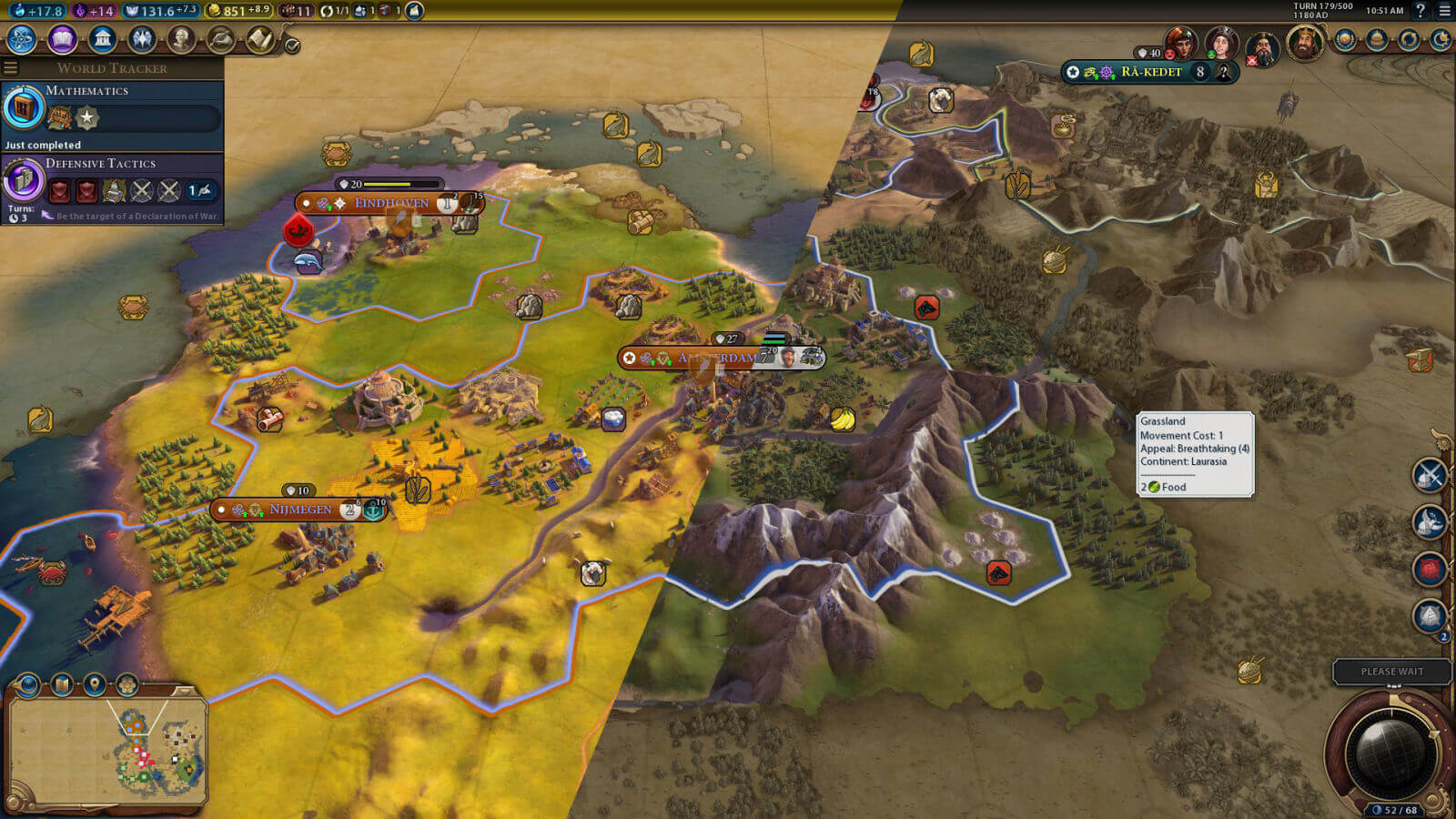 It took Civilization V two full expansions to become the classic it's regarded as today. Civilization VI is halfway there.
It took Civilization V two full expansions to become the classic it's regarded as today. Civilization VI is halfway there.
While my 2016 review of Civ VI was glowing, it did come with the historical reservation that Civilization games are so big, and their design process so ever-evolving, that they're rarely a masterpiece from the get-go. So while Civ VIshould be lauded for some of its positive steps, like the intricate district system and more flexible policies design, it also shipped with (relative to the series) poor diplomacy and some terrible AI.
Rise & Fall addresses some of these issues. But for the most part, the things it introduces aren't interested in fixes; they're instead looking at shaping your experience into something more intimate than you may be used to with a Civilization game.
There's lots of new stuff on offer in this expansion, from UI tweaks to new factions, but I'm not here to rattle off bullet points. I'm instead going to be talking about R&F's three main additions, and how they all work together to change the way each game of Civ VI feels.
Governors

Governors are a new addition to the series. Players are able to choose from eight of them over the course of a game, and each one specialises in something. If you take a look at the image above you'll see that there are governors devoted to matters like the military, production, religion and diplomacy.
You appoint a governor to one of your cities, and once there any of the abilities they've unlocked will apply to that settlement. So if you've got a frontier city that's your bulwark against invasion, it might be a good idea to place Victor, the militaristic governor, there. And as the game goes on, you'll earn points you can spend on either unlocking more governors or adding new powers to the ones you've got.
They're important, not just for the benefits their powers provide, but also for the boost they offer to a city's loyalty. See, in R&F, there's a new loyalty system that blends old series ideas on border influence and happiness and turns them into something better. Cities close to the borders of a rival may see their allegiance to your empire slowly drained away, which makes border interplay more interesting.
These influence powers also have the wonderful side-effect of neutering the old Civ dick move of founding a tiny new city right in the middle of another empire, because doing this now will see the fresh settlement eaten up by the cultural forces of its surroundings in a heartbeat (the ebb and flow between larger, more established cities is far less drastic).
Governors give Civ VI a much more satisfying feeling of, well, governing. Each one is so specialised, and so powerful, that their deployment and training help remove a lot of the sense of helplessness some aspects of Civ (like loyalty and borders) could previously leave the player with.
Ages & Eras

The idea of a "golden age" is nothing new in Civ. Nor is a codified progression through eras, like "medieval" and "industrial". But the way they're implemented in R&F is new, and it's maybe my favourite part of expansion.
Previously, the player would do these things alone. A golden age would be triggered by something you did, and your progression through ages was determined solely by how many techs you'd discovered.
Now, the world is united. Everyone moves through the ages together, regardless of their level of technological advancement, and every time they do, R&F takes stock of how you did over the last few centuries. Players doing some good Civstuff are rewarded with a golden age, which increases their loyalty. Players who are lagging behind get stuck with a dark age, which decreases their influence on the map around them.
Most times, you'll end up in the middle in a "normal" age, which means business as usual, and whichever age you end up in, you'll be able to assign perks that either help you get closer to a golden age or, if you're in one, giving you powerful advantages over your rivals.
Which sounds unfair, and for a little while, it is! But the ages are designed to be rubber-banded. It's easy to propel yourself into a golden age from the dark ages, and it's just as easy to find yourself sliding in the opposite direction (though R&F doesn't go crazy with it....I found that I'd usually go through one of each age per game).
This swinging pendulum adds a little bit of urgency and compulsion to act in parts of the game that might otherwise have become a bit of a "click next turn" drag.
Diplomacy

The scope and scripting of your relations with other leaders was one of the most disappointing things about Civ VI at launch. Your rivals were erratic, and alliances seemed almost pointless since you could never trust the AI from turn to turn.
You...still can't trust them, for the most part, but one area things have been changed for the better are alliances. Instead of simply forming an alliance with another player and have it mean you are now just best buds in general, you can now choose from several different types of alliance, ranging from military to research, with each one tailored towards a specific shared bonus.
And the longer you maintain alliances, the stronger they become. I played a game as Scotland and (sorry) formed an alliance with England during the Medieval era. This endured for the rest of the game, taking in all kinds of deals, and renewals of our oaths were offered as much by the AI as were driven by myself.
We researched together, we traded, we fought in countless wars, England sometimes coming to my aid against the dominant Chinese, I sometimes coming to hers against her pesky neighbouring Poles.
This sounds minor, but it really helps draw you out of a sense of loneliness that Civ VI could sometimes leave you stuck with. It's now in your interest to reach out to your neighbours for more than just the uranium you don't have, and the relationships you form over the years really help form strong bonds.
The three new features above, as separate as they seem divided on the page like this, are all working together towards a common goal: drawing you closer to the world, making you feel like you're a part of it, instead of just a distant observer.

The governors add a dash of personality to your own Civilization, where previously the only other charm in the game could be found in your opponents. The new ages system breaks up everyone's isolated paths and binds the world together. And alliances now let you generate a game-long feeling of friendship with another Civ, where previously you could only loathe.
Civ VI's Lead designer Ed Beach has a ton of board game design experience, and that was one of the enduring feelings I took away from the game when I first played it: how Civilization had become more tactile, both in terms of how you interacted with it and how it looked.
Rise & Fall continues this good work. Sure, there are still rough edges across the game---trade routes and spy networks are tedious and poorly signposted, and naval AI remains a disaster---but this isn't a patch, or a seasonal upgrade designed to fix things.
It's a substantial expansion to Civ VI, and it's main objective has been to drag you down from the distant heavens and put you to work amongst your people, rather than somewhere a few thousand feet above them.
Back in November, I said this expansion was coming at just the right time because Civilization VI had grown stale, with thousands of players preferring its 2010 predecessor over the more recent---and many fans would argue incomplete---effort.
Well, if you go by the rule that games in this series need two expansions, then Civilization VI is now a much more complete game. Rise & Fall gets its hooks in deep, showing that the enlarged game's greatest strength may not be its scale or its history, but the sense of togetherness it inspires, and the way it drags the player down to the surface of its gorgeous world.
